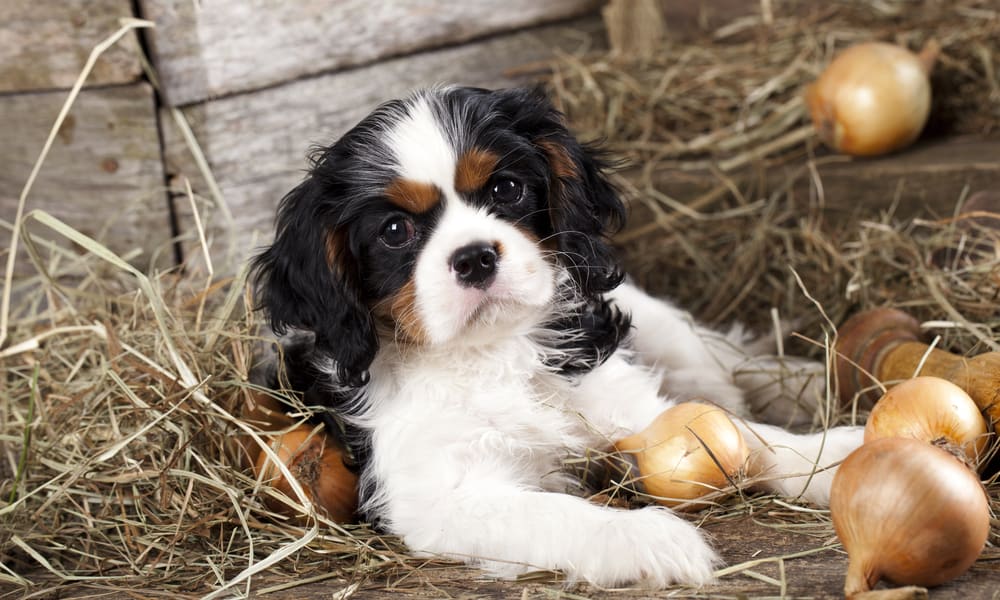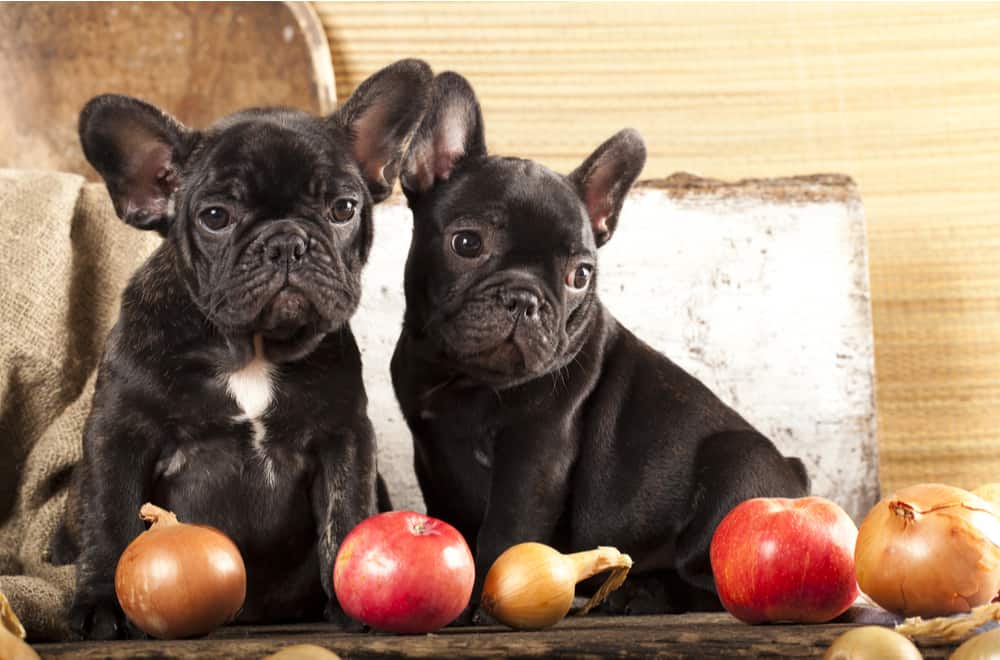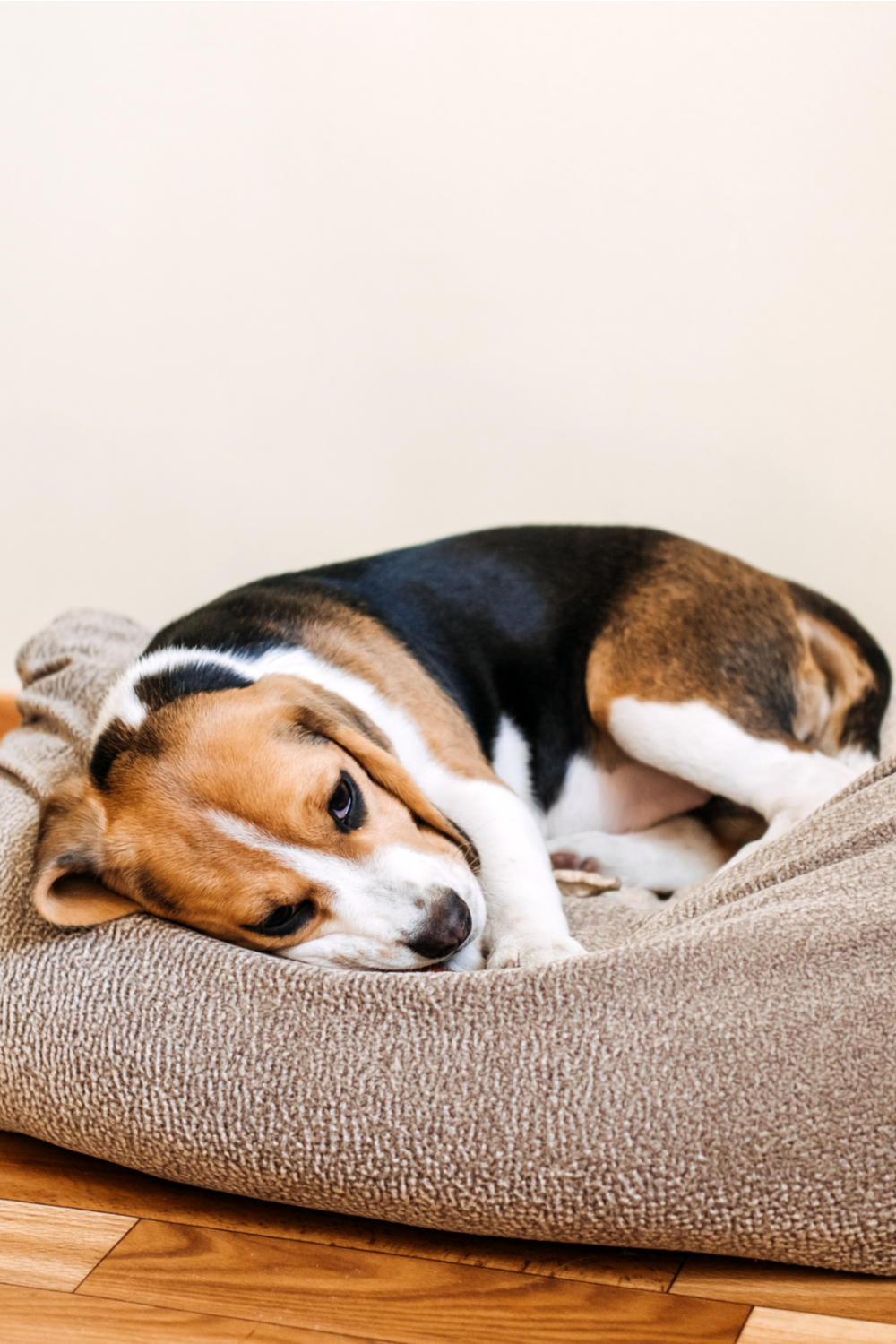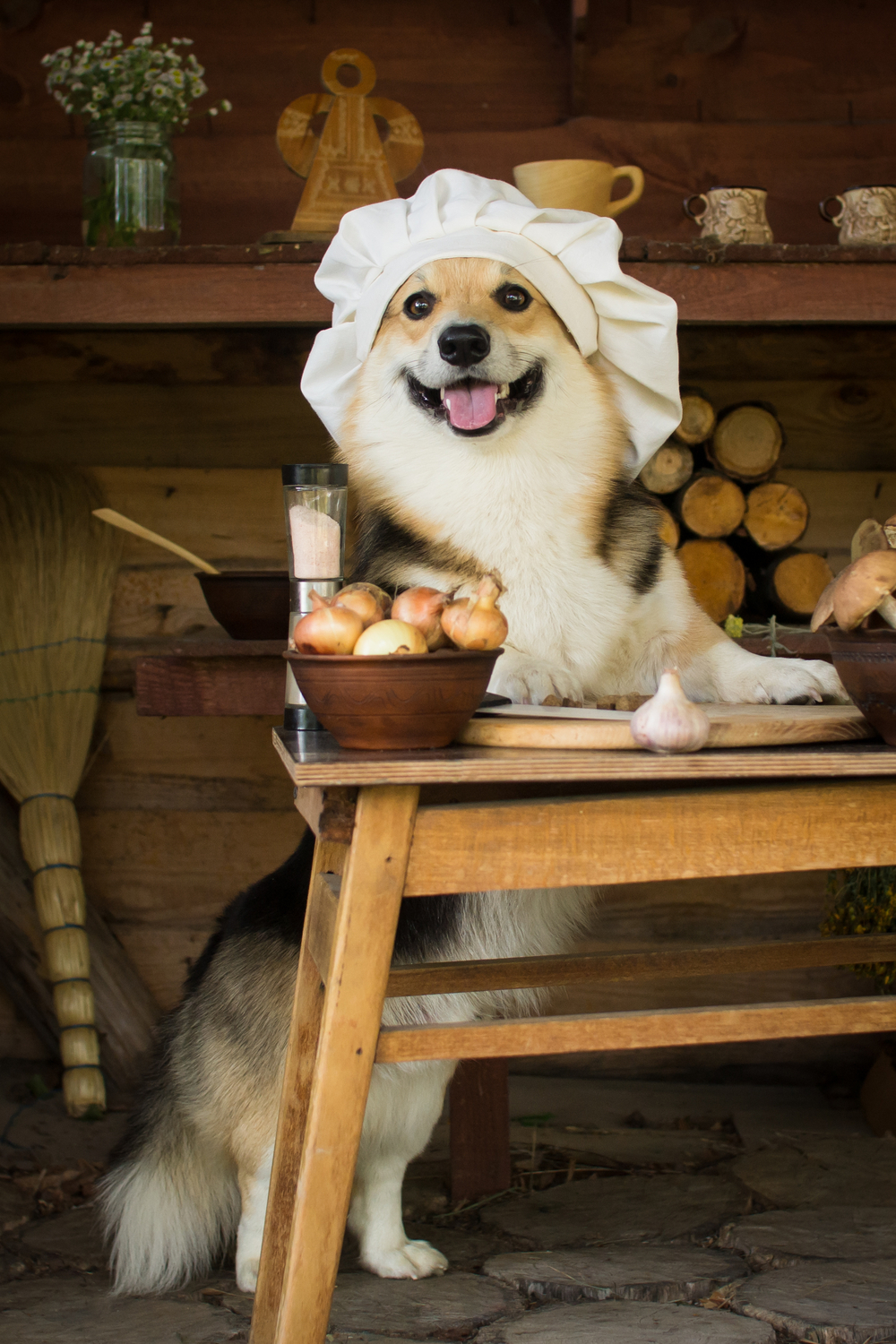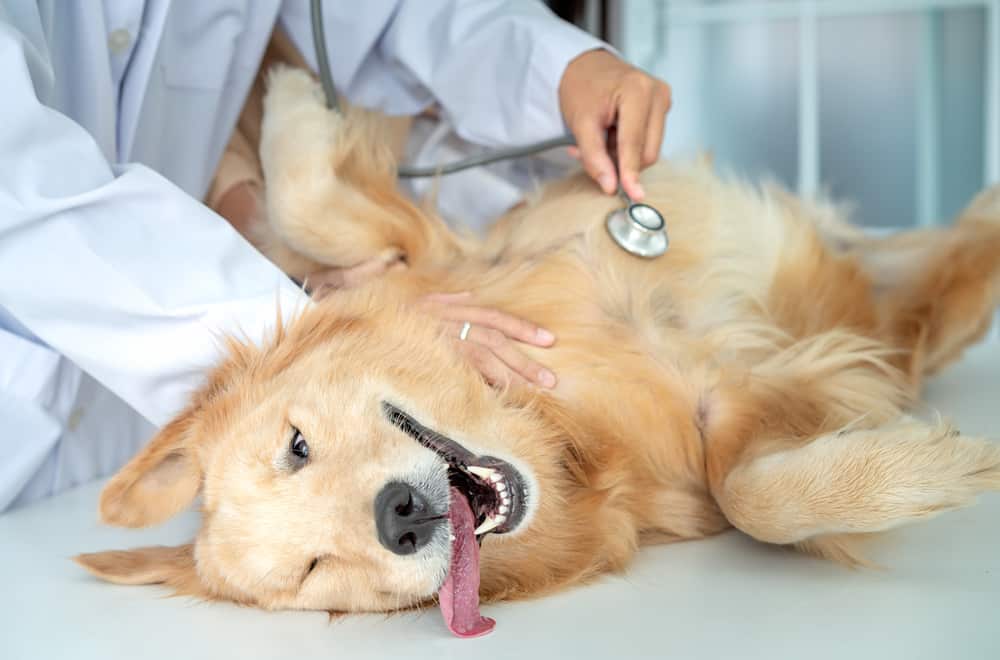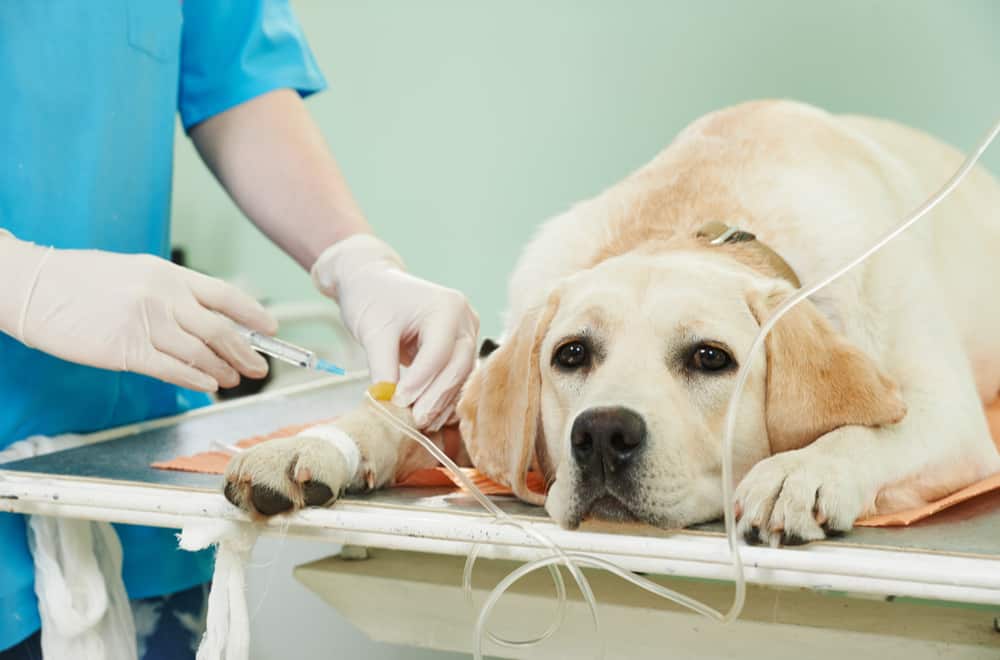Dogs aren’t fussy eaters, and they’re well known for gobbling up just about anything they can get hold of. The problem is, they don’t know when something is not good for them, and much of the food we eat isn’t suitable for our furry friends – with onions being a prime example.
Along with things like chocolate and grapes, onions should be high on the list of foods we should never let dogs eat, and to give you all the information you need – including what to do if your dog manages to eat some – here we discuss the question, why can’t dogs eat onions?
If you want a quick preview of some of the things we’re going to be talking about, you can also check out this video before reading on.
The science bit – what is it about onions that dogs can’t stomach?
There are some foods like grapes that are bad for dogs without us really understanding why – we just know that they are highly toxic for dogs and that we should never let dogs near them.
However, this is not the case with onions since we know exactly what it is that causes dogs to get sick.
The main culprit is a compound known as N-propyl disulfide, and the problems come from the way it affects a dog’s red blood cells.
First, it reduces the red blood cells’ ability to carry oxygen around the body, but even worse, it also makes the body think that its own red blood cells are invaders and so starts to attack them, something known as hemolysis.
The result is that red blood cells end up being destroyed more quickly than the body can replace them, and this leads to a condition called hemolytic anemia.
As if this wasn’t enough, onions also contain a substance called thiosulfate, which dogs’ bodies are unable to process, and organosulfur, another nasty component that causes toxicosis in dogs.
So all in all, it’s pretty clear that onions should be nowhere near the menu for our four-legged friends.
How much onion will make a dog sick?
But how much are we talking about? Will a few pieces of onion picked up from the kitchen floor make a dog feel sick? Or will he have to eat a lot to feel any adverse effects?
Well, the answer is probably somewhere in between – and it also depends on the size of the dog in question. This is because, logically, a large dog like a rottweiler will be able to handle a larger quantity of onion than something small like a chihuahua.
One estimate suggests that a dog needs to consume around 100g of onion per 20kg of body weight, which equates to about one whole onion for a medium-sized dog.
The good news is that most dogs are unlikely to simply devour a whole raw onion they find on the floor, but there are plenty of other ways for dogs to ingest enough onion to make them sick – which we’ll come to in a moment – so the risk is far from negligible.
What are the symptoms of onion poisoning?
So what happens if a dog eats onions? And what are the symptoms of hemolytic anemia and onion toxicity?
Since eating onions lowers the amount of oxygen in the blood and reduces the overall number of red blood cells in the body, it follows that common symptoms will include lethargy and weakness.
This may be accompanied by things like diarrhea, vomiting, a loss of appetite, pale gums, temporary loss of consciousness, a reddish tinge to the urine and an elevated heart rate.
Sometimes dogs can also suffer from dermatitis, asthma and ataxia (a lack of coordination).
Another possible effect, although not a symptom you are likely to notice, is that eating onions can even cause liver damage as the body tries its best to deal with the toxins.
An important point to note is that these symptoms will probably not manifest themselves immediately unless the dog has ingested an extremely large amount of onion.
Rather, the effects will begin to appear after a couple of days, and you may notice the symptoms coming on slowly.
Also, a dog can develop these symptoms from eating a large portion of onion all in one go, but the effects will also appear – even more slowly – if the dog is eating small amounts of onion regularly over a long period.
Can dogs eat cooked onions? And what about related foods?
An important point to note is that onions are unsafe for dogs in any form. This means dogs shouldn’t eat raw onion or cooked onion, and all parts of the onion are toxic for them, including the main flesh, the skin, the leaves and the juice.
Furthermore, onion powder is also toxic for dogs – in fact, more so because it contains an even higher proportion of N-propyl disulfide.
In addition, all related plants in the allium family are equally dangerous. This means scallion (spring onion), shallots, leeks, chives and garlic are also dangerous for dogs.
Garlic is particularly bad since it contains a high concentration of N-propyl disulfide, and garlic powder is the worst of all.
The thing to note is that onion and other members of the allium family are surprisingly ubiquitous in human food, so you need to check the ingredients carefully before sharing anything from your plate with a dog.
Better still, give dog food to your dog and keep the human food for yourself. If you have some bones or scraps of meat left on your plate, that’s probably ok, but the food we eat has so much stuff that can be dangerous for dogs that the best policy is not to share with your animals.
What should you do if your dog has eaten onions?
If you suspect your dog has consumed onions, the best course of action will be determined by how much he managed to eat.
If the amount was small relative to his body size and it was just a one-off, all you need to do is keep an eye on him over the next couple of days.
If he shows none of the symptoms as described above, there’s a good chance everything is fine.
However, if the amount consumed was more significant, or if he starts displaying any of the symptoms listed above, you need to get your dog to a vet as soon as possible.
When a dog consumes a large amount of onion in one go, treatment will be considerably easier if the dog reaches the vet quickly, so if you know your dog has managed to scoff a lot of onion, don’t wait before seeking help.
In the very worst cases, onion poisoning can be fatal in dogs, so getting help early can potentially save your pet’s life.
What is the treatment for onion poisoning?
When you take your dog to the vet, the treatment will depend on the amount of onion the dog ate relative to her body weight, how quickly you got her to the vet and how ill she is.
If the vet thinks your dog has consumed a dangerous amount of onion, the first step will probably be to induce vomiting, especially if the onion was consumed in the last two hours or less.
This will remove the onion from the dog’s system before it has chance to be digested, and the worst of the effects can be avoided.
Another similar option is to flush the dog’s stomach, for the same reason, and the dog may also be administered activated charcoal, fed to her in wet dog food.
Activated charcoal binds drugs and toxins to itself, reducing their harmful effects. It will also turn the dog’s poop black, but this is nothing to worry about!
In more serious cases, dogs may be given IV fluids to flush the toxins from the bloodstream as well as to keep the dog hydrated.
Since hemolytic anemia will cause oxygen levels in the blood to drop, in the most serious cases, dogs may require supplementary oxygen, and they may even need a blood transfusion to keep them alive.
No need to panic
That said, if all this seems rather dramatic, you don’t need to panic. These kinds of extreme cases are relatively rare, and as long as the dog is treated quickly, the prognosis is good.
In most cases, once the dog is stabilized, the treatment will consist mostly of looking after the unwell dog and nursing her back to health.
Your dog’s body will need time to replenish its supply of red blood cells, but after that, your pet will probably make a full recovery and won’t suffer any long-term damage.
Prevention is better than cure
If you think onion poisoning in dogs is something you’d rather avoid, you’d be right. The experience is never fun for the dog, and it can be traumatic for the owner too.
This means, as ever, that prevention is better than a cure, so here are a few suggestions that will help you avoid your dog ever suffering these kinds of issues.
1. Be aware of onion poisoning and how it can happen
While almost every dog owner knows that dogs can’t eat chocolate – and that grapes are highly toxic for canines – knowledge about onion poisoning is probably not so widespread.
This means the first step is educating yourself about the effects of onions in dogs – and if you’re reading this, you’ve already taken the first step.
The thing to remember is that many human foods contain onions or garlic in the ingredients, making these foods potentially harmful for dogs.
If you want to share any human food with a dog, make sure you check the ingredients carefully.
But since there are so many other foods that can also make a dog sick, the best option is probably just to keep the human and dog menus separate and not share your food. That way, you’re never taking any risks.
2. Don’t leave food in places where dogs can reach it
While raw onions are probably not the kind of food item a dog is likely to sniff out and gobble down (although with some dogs, you can never put it past them!), other foods containing onions or garlic may seem more attractive to your furry buddies.
For example, a bag of fried onion rings or some crunchy garlic bread are just the kind of tasty snacks a dog will devour without a second thought, and by the time you realize the dog has found them, there probably won’t be anything left.
People are often amazed that dogs manage to find food that their owners thought was well hidden, but never forget that dogs have a far more powerful sense of smell than us, and they know exactly where the food is stashed, even if they can’t see it.
This means you need to make sure the food is out of the dog’s reach rather than just hidden because if they can get to it and they like the smell, nothing will stop them eating the whole lot the moment you’re not looking.
3. Be careful with all the foods that dogs shouldn’t eat
If you have dogs in your home, you should always be careful with all the different foods they are sensitive to and take extra care that they can never grab any.
For example, if you are cutting onions or garlic, make sure none falls on the floor – and if it does, make sure you clean it up before your pets can come in and lick it off the floor.
4. Pay attention to cats too
If you also have cats in your household, be aware that onions and other members of the allium family are even more toxic for them.
However, since cats are far more fussy eaters, it’s much rarer for them to suffer from onion poisoning since they are unlikely to ever eat anything with onion in it.
Final words
As you’ve probably worked out by now, dogs – or cats – should never be fed anything with any onion in it. No ifs, no buts, just never.
However, if they do manage to consume something, you don’t need to panic. As long as you take them to a vet and get them the necessary treatment as quickly as possible, there’s every chance they’ll make a quick recovery with no lasting harm done.
